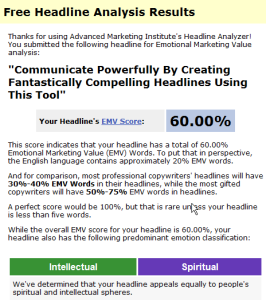Anyone who has produced content knows that strong headlines are “bait” that invite a visitor to read. Weak headlines can absolutely kill really good content, by leaving it up to the reader to guess why they should bother reading an article or a story.
Anyone who has ever conducted a few Ebay sales of their own knows that coming up with meaningful, interesting headlines is a challenge. But strong headlines are also the key to getting people to linger long enough to – perhaps – buy from them.
If you clicked on this article, you were probably attracted by the premise of the title: it promises to give you a way to have something that you want, presumably by not investing very much effort or time or money.
That’s the power of a headline.
The tool that this post is about is something called the Headline Analyzer on a site promoted by a group called the Advanced Marketing Institute.
Here’s what the Analyzer has to say about this headline. (And here is a mea culpa, as if you couldn’t guess: I kept rewriting this headline until it scored fairly high on the Analyzer.)
Why the Headline Analyzer is Important
This analyzer does not take the place of judgement, experience, and writing skills.
What it does do is provide you with a “reality check” of headlines that you create – particularly when you don’t have a very good feeling for their impact or effectiveness.
What the Headline Analyzer Doesn’t Do Very Well
The headline analyzer does not synthesize headlines for you.
The headline analyzer does not care about whether the words in the headline even make sense. (I tested it. Scrambling the words in this headline makes no difference in the score. The headline analyzer ain’t semantic by a long shot.)

Oopsies.
The headline analyzer does not do a good job of grading headlines that rely upon the context – those headlines that preface some highly effective but unconventional ad copy.
It also fails miserably at analyzing correctly when almost all of the power of the headline comes from the cultural context or the expectations of the reader.
Here are some failures of the headline analyzer (and you can test them, or other headlines, yourself):
- “How to Win Friends and Influence People” – 42.86%
- “At 60 miles an hour the loudest noise in this new Rolls-Royce comes from the electric clock” – 11.76%
- “My Sears Kenmore Sewing Machine has 9 Different Stitches – Imagine!” – 10.00%
The headlines I sampled above are from a list that floats around on the internet called “The 100 Top Best Converting Headlines of All Time.” The first headline, of course, is the title of the famous book on interpersonal relations by Dale Carnegie. The other two headlines are headlines from classic ad campaigns from decades ago. The EMV score for the title of Dale Carnegie’s book is decent, but belies the fact that it is one of the most successful books on human relationships of all time.
Conclusion – How I Recommend Using the Headline Analyzer
To summarize:
- The Headline Analyzer, as I mentioned, does a superb job of providing you with a “reality check” of headlines that you create -and especially when you don’t have a very good feeling for their impact or effectiveness.
- The Analyzer effectively tests and measures a very conventional copywriting style that relies primarily on emotionally compelling trigger words.
- The Headline Analyzer works well for stand alone headlines. When the power of the headline relies upon the body copy (the stuff in the actual ad or the rest of the article), the analyzer will not give you a meaningful score.
- The Headline Analyzer won’t work well at all for culturally tied or extremely topical headline topics that rely on events in the news, etc.
- If your very best efforts at creating headlines score quite low using the Analyzer, then you probably need to look into finding a copywriter or other media professional to help you with your copy. (This really isn’t a plug for my services. You should have decent copy in hand before spending a lot of money on AdWords, print advertising, direct mailings, etc.)
Disagree? Have A Better Tool to Recommend?
I’m all ears. Please use the comment form to cast more light on this topic of automated copy testing.


I love your testing of the headline analyzer. What a great idea to test it with the 100 top best converting headlines of all times. Your observations on why the analyzer dislikes certain headlines is especially perceptive.
Testing rewrites of the same headline for intellectual vs. empathetic vs. spiritual impact may also provide interesting insights on how a small change can have a mighty impact on scoring.
-Diana
Hi, Diana,
Thanks for stopping by. I have tried to dig up some background information on this tool and web site and I’ve gotten nowhere.
Without some clear documentation about its criteria for scoring passages, which I have been unable to find, and some more detailed analysis of the quality of its results, it’s not possible (nor, in my opinion, very safe) to attribute a lot of meaning to it.
For me it is an interesting novelty. I may recommend it to prospects who insist on writing their own copy, as a reality check.
Don